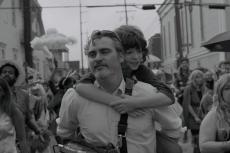「脚本を書き始めたのはアメリカが本当におかしくなり始めた頃。とても私的な世界における親密さを描いて、それをアメリカに放り出したかった」 『カモン カモン』 マイク・ミルズ監督インタビュー/Interview with Mike Mills about “C’mon C’mon”
NeoL / 2022年4月25日 20時0分
「脚本を書き始めたのはアメリカが本当におかしくなり始めた頃。とても私的な世界における親密さを描いて、それをアメリカに放り出したかった」 『カモン カモン』 マイク・ミルズ監督インタビュー/Interview with Mike Mills about “C’mon C’mon”
マイク・ミルズ監督が主演にホアキン・フェニックスを迎えた待望の新作『カモン カモン』が絶賛公開中。自身と父親との関係をモチーフにした『人生はビギナーズ』(2010)、そして、母親との関係をモチーフにした『20センチュリー・ウーマン』(2016)に続く、新たな家族の物語だ。ミルズが子どもをお風呂に入れているときに思いついた作品だといい、自身が子育て中に経験した数々の想定外の出来事もインスピレーションとなった。フェニックスが演じるのは、突然9歳の甥っ子ジェシーの面倒を見ることになったラジオジャーナリストのジョニー。映画は、慣れない子育てに戸惑っていたジョニーが、ひとりの人としてジェシーと向き合ったときに生まれた奇跡のような瞬間を、モノクロの美しい映像で描き出す。日本公開を前に監督へのリモートインタビューを行い、映画の製作秘話や作品への想いを聞いた。(→ in English)
――日本公開おめでとうございます。監督のお父さんの物語である『人生はビギナーズ』(2010)と、お母さんの物語である『20センチュリー・ウーマン』(2016)に続く本作では、子どもが主軸に描かれています。なぜ今、このタイミングでこの映画を撮ろうと思ったのですか?
マイク・ミルズ「理由の一つとしては、これが親になった今の僕の現実だからです。僕は自分がよく知っている、観察することができて、愛していて、そして、自分を混乱させるような人たちについて書くのが好きなんです。それによって正直な作品が生まれ、ある種の緊迫感や現実性が加わるような気がします。他のフィルムメーカーによるそういった作品も大好きなのですが、どことなく実在の人物が感じられるんですよね」
――本作の制作はいつ頃から始めたのですか?
マイク・ミルズ「脚本は2016年の大統領選が終わった後に書き始めました。今もそうですが、当時はアメリカが本当におかしくなり始めた頃だったんです。だから、とても私的な世界における親密さを描いて、それをアメリカに放り出したいと思いました。そこで、親密な関係にある2人がアメリカを歩き回る姿を描いたわけですが、それはトランプや彼にまつわるすべてに対する反動でした。また、子どもたちの声を通して(※劇中には全米各地の子どもたちのインタビューがフィーチャーされている)、彼らから見たアメリカの現状や、アメリカでの生活を映し出したかったんです。つまり、これはすべて、現在アメリカで起こっている変化に対する反応なのです。リベラルな人間にとって、それはある意味、とても怖くて困惑させられる状況です」
――『20センチュリー・ウーマン』は非常に私的な作品でありながら、同時にアメリカの歴史も描かれていました。本作もまた、とても親密な作品でありながら、より大きな世界観につながっていますね。
マイク・ミルズ「僕はすべての作品でそうしてきたような気がします。『人生はビギナーズ』はゲイだった僕の父の物語ですが、ゲイであるということは、政治的であり、歴史的なことなんですよね。だから、ハーヴェイ・ミルクをフィーチャーしたり、彼とアメリカのLGBTQ史の関係を見せたりしました。『20センチュリー・ウーマン』は僕の母の物語ですが、それは1925年に生まれたジェンダー・ノンコンフォーミングの女性の歴史を紐解く物語でもあるんです。僕は個人がいかに政治的か、あるいは、個人がいかに歴史的かということに、とても興味があります。それさえあれば、映画を制作して多くの見知らぬ人たちと共有したり、日本に届けたりする価値があると感じられるのです。本作もある意味、より大きな世界とつながっています。アダム・マッケイの『ドント・ルック・アップ』とは違うけどね(笑)。あからさまに政治を描いているわけではないけれど、僕にとって、本作の中心には政治と歴史が深く織り込まれているんです」
[caption id="attachment_113794" align="alignnone" width="2000"]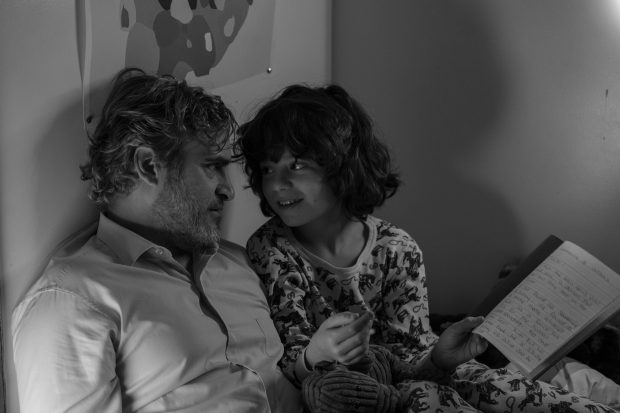
Joaquin Phoenix, Woody Norman (L-R)[/caption]
[caption id="attachment_113795" align="alignnone" width="1786"]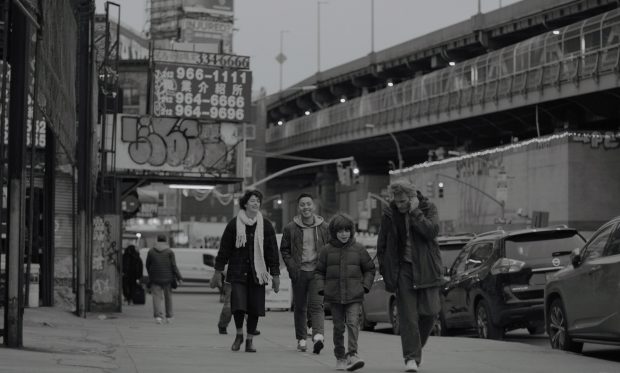
Molly Webster, Jaboukie Young-White, Woody Norman, Joaquin Phoenix (L-R)[/caption]
――主演のホアキン・フェニックスの演技が素晴らしかったです。いつ頃から彼にジョニーを演じてほしいと考えていましたか?
マイク・ミルズ「ホアキンには、僕の作ったすべての映画に出てもらいたかったくらいです(笑)。脚本を書いているとき、友人たちに『あなたに似た役は誰に演じてもらうの?』と聞かれたので、『ホアキン・フェニックス』と答えたら、誰もが『何それ!? ありえない!』という反応で。僕にとっては、それが良かったんです。最高のアイデアだと思いました。僕はとても優しくて親切な人というイメージを持たれているのですが、ホアキンはそう思われていないわけですよね。でも僕はホアキンのことを、とても賢くて楽しい人だろうと思っていて、実際にそれは当たっていました。彼はありふれたものや常套手段を使うことを嫌い、最高レベルで観客を魅了することを目指しています」
――ホアキンの出演はどのようにして決まったのですか?
マイク・ミルズ「僕たちは出会ってすぐに意気投合したのですが、『この役はできないと思う。作品のテーマはどれも本当に興味深いけど、自分の演じ方が見出せないんだ』と言われました。でも、僕らはウマが合ったので、ずっと交流は続けていたんです。『自分には無理だ』と言っていたホアキンですが、翌日には作品についての質問が送られてきたので、まだ話は終わっていないんだな…と思いました。笑い合ったり、家族や姉妹や兄弟や子どもなどについて話したりするようになって、そんな会話がいつまでも続いて、今に至るという感じです」
――ジョニーの甥のジェシー役を演じたウディ・ノーマンも素晴らしかったです。とても自然体で、演技をしているようには見えなくて。現場ではどのような演出をしたのですか?
マイク・ミルズ「彼は本当に素晴らしかったから、あまり話をする必要がありませんでした(笑)。僕の仕事は、ウディが自由に感じられて、心配事はないと思えるようにすること。そして、役に対する自分の意見に自信を持ってもらい、遊び心あふれる楽しい現場を保つことでした。それはまさにホアキンが好む仕事のやり方で、ギャビーも同じでした。みんな奇妙なほどに、本当によく似ているんです。彼らは家族みたいな関係だったので、ある意味、僕のキャスティングは天才的だったのかもしれないな」
――素晴らしかったです。
マイク・ミルズ「僕とホアキンは、できるだけウディの好きなように、彼のやり方でやらせようと考えていました。ウディは自由を与えれば与えるほど良くなりました。彼が何か行き当たりばったりのことを言ったり、僕らが想像していなかった演技をしたりすると、とても説得力があるので、ホアキンはウディのことをXファクターと呼んでいました(笑)。ちゃんと意見を持っているし、とても強い人で、僕たちはウディのそんなところが大好きなんです。ベッドでホアキンが『オズの魔法使い』を読み聞かせているときに、ウディから『どうして結婚していないの?』と聞かれるシーンがありますよね。あれはすべて脚本に書かれていたのですが、僕とホアキンは撮影の直前にウディがいる前で話し合って、『あのやり取りはカットして、読み聞かせだけにしよう』と決めました。ちゃんと話を聞いていなかったのか、それとも彼の思いつきだったのかはわからないのですが、カメラが回ったら、ウディが聞く予定のなかった質問をしたんです! ホアキンは『えーと…』という感じで、よく観ると彼が本当に驚いているのがわかるはずです(笑)」
[caption id="attachment_113796" align="alignnone" width="2400"]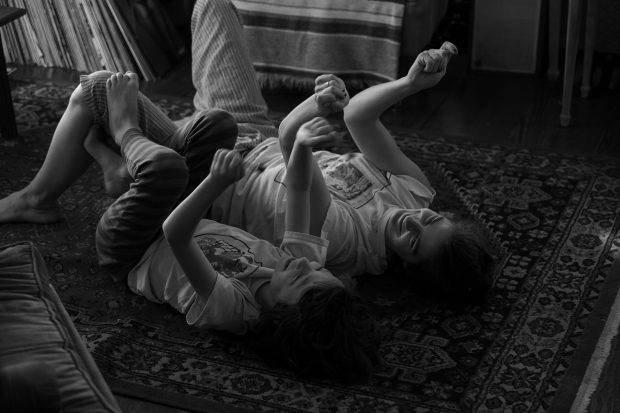
Woody Norman, Gaby Hoffmann (L-R)[/caption]
[caption id="attachment_113797" align="alignnone" width="1795"]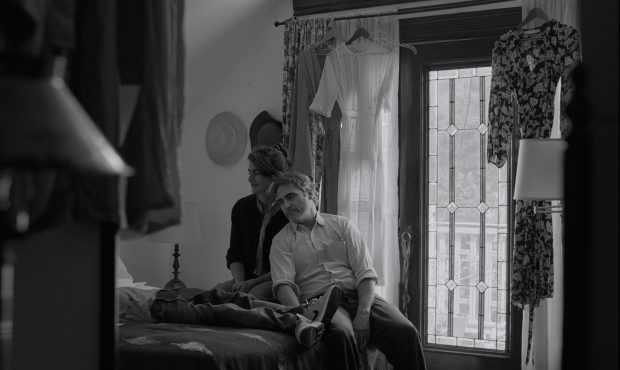
Gaby Hoffmann, Joaquin Phoenix (L-R)[/caption]
――ジェシーとジョニー、そして、ジェシーの母親であるヴィヴの間にある親密さが、とてもリアルに感じられました。それぞれの役を演じたウディとホアキンとギャビー・ホフマンは、どのように仲を深めて、お互いに対する信頼関係を築いたのですか?
マイク・ミルズ「実は彼らは何もしなかったんです。僕は普段だと(役者の仲を深めるために)いろんなことをするのですが、ギャビーとホアキンそれぞれから、『(事前に)会うべきではないと思う。顔合わせはジョニーが訪ねて来るシーンにするべき』と言われました。ホアキンとウディに関してはオーディションのときに会っていたのですが、それは撮影の何ヶ月も前の出来事だったので、準備期間中は会わせないようにしました。撮影中は、撮影以外でもたくさんの時間を一緒に過ごしました。本作は長い時間をかけて、すべて時系列に沿って撮影したんです。ロサンゼルスで撮影して、それからニューヨーク、そして、ニューオーリンズへ。ニューオーリンズに着く頃には、ウディとホアキンは最高の友だちになっていました。2人の間には、僕と彼らにはない関係性があります。ある意味、それは意図していたことでもありました。僕はそういうことが起こるような世界観を作り上げるのが好きなんです」
――『20センチュリー・ウーマン』の母親やアビーなど、監督の作品には印象深い女性たちが登場してきましたが、本作のヴィヴも素敵でした。特に彼女が息子に対して抱いている複雑な感情について、ジョニーに打ち明けるシーンが印象的でした。
マイク・ミルズ「ヴィヴの人物像は、僕が大好きな3、4人のママ友を組み合わせたものです。ギャビーはとても(ヴィヴと)似ていて、彼女自身も母親だし、世界観も似ています。でも、あのシーンはホアキンのアイデアだったんです。彼は子どもがいる女友だちから、あのシーンでヴィヴが話したようなことを聞いたそうで、女性が母親として背負わなければならないものが、いかに男性とは比べものにならないほど強烈で異なるものなのか説明してくれました。それは、まるで別世界なのです。僕たち男2人は、その違いに愕然として、ただひたすら語り合い、理解しようとしていました。ホアキンの友だちは複雑な感情を抱えて悩んでいたけれど、会話の終わりには母親にしかできないような、素晴らしい育児のアドバイスをしていたそうです。『プロテインを与えれば大丈夫だよ』とかね。僕は『今の全部、映画で使っていい? 書き留めていいかな?』と聞きました(笑)。だから、すべてはホアキンが話してくれたことで、それを僕が脚本に書き、ギャビーが演じています」
――本作は美しいモノクロ映像で描かれていますが、その意図は? 特にビーチのシーンが素晴らしくて、小津安二郎監督の映画で観たモノクロの海を思い出しました。
マイク・ミルズ「フェリーニの映画にも、モノクロで撮影したビーチのシーンがたくさんあるんです。ビーチでの撮影時は桟橋などもあって、まるでフェリーニの映画の中にいるような気分になりました。僕の好きな映画の多くはモノクロですし、もっとモノクロ映画が増えればいいなと思います。今回はモノクロで撮影するために周りの人を説得しました。さまざまな風景の中を歩いていく子どもと大人の姿を映し出すことで、作品の一部分を神話的に、まるで寓話のように描くことを提案したのです。子どもと大人の歩く姿は典型的な神話のイメージで、そこには何かとても良いものがあります。他にも、2人が歩いているシーンでは『月の光』を流すとか、ある種の古代神話のような雰囲気を生み出すことを提案しました。それにはモノクロ映像も一役買っていて、なぜなら、モノクロは現実ではないからです。現実を描いているようでいて、現実ではないというか」
――なるほど。
マイク・ミルズ「それに、僕は線画が大好きなんです。僕はこの映画を絵画というより線画として捉えています。バスタブに横たわる妻を描いたボナールの絵のような、とても親密だけど素早く描かれたスケッチのようなイメージです。絵画はとても壮大であり、観る人に対して壮大であることを伝えています。自分の映画については、謙虚でありながらも、実は壮大でありたいと思っています。そういう点でもモノクロ映像はいいなと思いました。さらに僕はサティのピアノ曲が大好きで、非常に大きな影響を受けています。サティの曲には奥行きがあり、音符の間を歩くことができて、とてもゆったりとしていて。そして僕にとっては、モノクロ映像もゆったりとしているんです」
[caption id="attachment_113798" align="alignnone" width="2700"]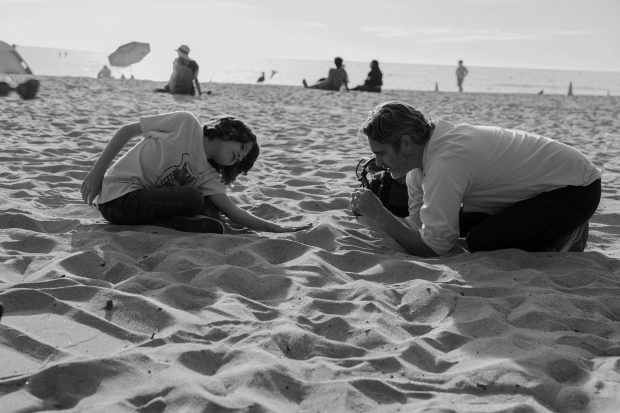
Woody Norman, Joaquin Phoenix (L-R)[/caption]
[caption id="attachment_113799" align="alignnone" width="1920"]
Woody Norman, Joaquin Phoenix (L-R)[/caption]
――本作には全米各地の子どもたちのインタビュー映像がフィーチャーされています。彼らのインタビューから得た最も大きなことは何ですか?
マイク・ミルズ「親として、そして、子どもと多くの時間を過ごしている者として、彼らがあれだけ賢いことや、洞察力が鋭いことは知っていました。それに、子どもは自分自身の弱さをさらけ出すことも、ありのままの自分を見せることも躊躇しません。だから、作品にあのようなパワーを与えられることはわかっていたんです。僕はただ、若者がどれほど知的で洞察力が鋭いかを、他の人たちにも紹介したいと思いました。
僕がこの映画でやりたいと思っていたことは、ドキュメンタリーのパートと物語のパートをミックスすることによって、何か新しいものを生み出すことでした。過去にもそういう作品はあったので、ものすごく新しいというわけではないけれど、僕にとっては新しく感じたんです。今回は現代の現実を描きつつ、それをモノクロで撮影しているわけだしね。クルーにはいつも、『自分たちがするべきことだけでなく、したいことも探求しよう』、『神話とドキュメンタリーのような、本来なら一緒にするべきではない要素を含む、新しい形のものを探求しよう』と伝えていました。物語や映画製作のあらゆる形態は、僕たちの業界や文化、習慣が認識しているよりも、ずっと広く開かれているように感じます。僕の映画はそんなに冒険的というわけではないけれど、でも、ちょっとはね(笑)」
――これから映画を観る日本のファンに伝えたいことはありますか?
マイク・ミルズ「僕がこの映画を作ったことから得た喜び、あるいは、この映画を作った人たちのコミュニティから得た喜びの一つは、『いろいろなやり方があるんだ』という感覚でした。物事に挑戦する方法は、とてつもなくたくさんあります。すべてをあまり深刻に考え過ぎないで、自分が純粋に心を揺さぶられることをやってみてください」
[caption id="attachment_113800" align="alignnone" width="2509"]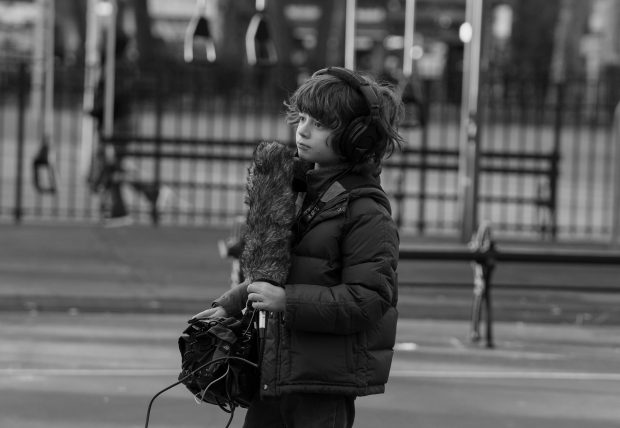
Woody Norman[/caption]
[caption id="attachment_113801" align="alignnone" width="1600"]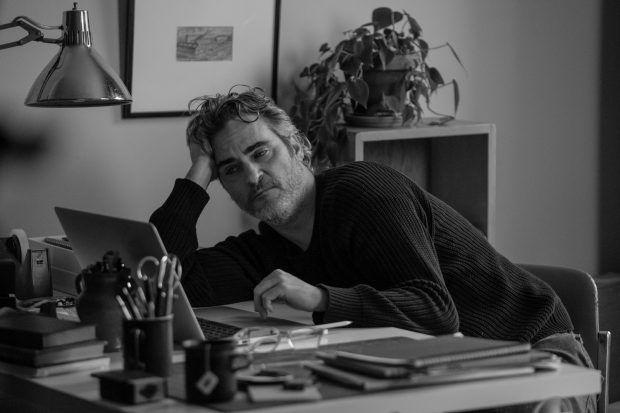
Joaquin Phoenix[/caption]
text nao machida
『カモン カモン』
絶賛公開中
公式サイト : happinet-phantom.com/cmoncmon/
監督・脚本:マイク・ミルズ『人生はビギナーズ』『20 センチュリー・ウーマン』
出演:ホアキン・フェニックス、ウディ・ノーマン、ギャビー・ホフマン
モリー・ウェブスター、ジャブーキー・ヤング=ホワイト
音楽:アーロン・デスナー、ブライス・デスナー(ザ・ナショナル)
配給・宣伝:ハピネットファントム・スタジオ
2021 年/アメリカ/108 分/ビスタ/5.1ch/モノクロ/原題:C’MON C’MON /日本語字幕:松浦美奈
© 2021 Be Funny When You Can LLC. All Rights Reserved.
公式 Twitter・Instagram : @cmoncmonmoviejp
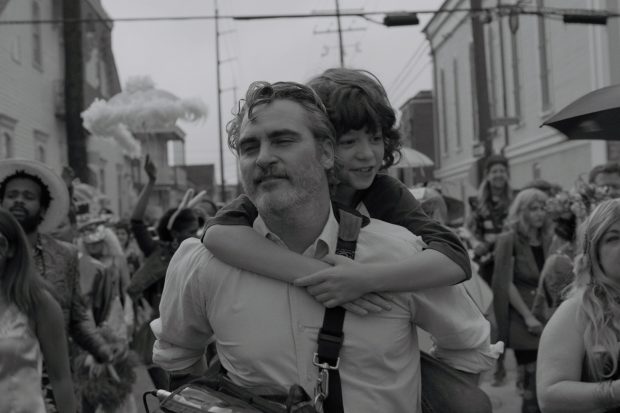
――Thank you so much for sharing your film with us in Japan! You made a film about your dad (“Beginners”) and then you made a film about your mom (“20th Century Women”), so it seems like a natural continuation to create this film, this time about a relationship with a child. What inspired you the most to tell this story at this moment?
Mike Mills: It's partly just because this is what's happening to me at this moment being a parent. I definitely like to write about people I know and can see and love and who confuse me, and I feel like that gives the film an honesty because it gives kind of an urgency or a realness. I love it when other filmmakers do that, you can kind of sense that there is real life in there.
――When did you start working on this film?
Mike Mills: I started writing this after 2016, after the election, when America was really beginning to go crazy as it still is. So I wanted to take this intimacy and this closeness in this very private world, and then kind of throw it out into America. So I have this very intimate relationship walk through America. So that was really a reaction to Trump and all that. And having all the kids’ voices, I wanted their version of what was going on in America, their version of what life is like here. So that was all like a real reaction to this transformation that's happening in America right now. It’s very kind of scary and confusing to a liberal person.
――“20th Century Women” was a very personal film, but it was also about American history. And this one too, with the kids talking about their views on the world, it is very intimate but at the same time, it’s within the bigger picture.
Mike Mills: I think I've been doing that with all the films. So “Beginners” is I guess my gay dad’s story, but being gay is political and historical, so it was showing Harvey Milk, showing his relationship to LGBTQ history in America. “20th” is about my mom, but also it's about her history, being a gender non-conforming woman who was born in 1925. So I am really interested in how the personal is political or how the personal is historical. That’s only one I feel if I have that, I feel like it is worthwhile making a movie and sharing with all these strangers or sending it off to Japan. It’s connected to the bigger world in some way. It's not like an Adam McKay movie, it's not like “Don't Look Up.” So it's not obvious politics, but politics and history are deeply woven into the heart of it to me.
[caption id="attachment_113794" align="alignnone" width="2000"]
Joaquin Phoenix, Woody Norman (L-R)[/caption]
[caption id="attachment_113795" align="alignnone" width="1786"]
Molly Webster, Jaboukie Young-White, Woody Norman, Joaquin Phoenix (L-R)[/caption]
――Joaquin Phoenix was great in this film. How early did you know that you wanted him to play Johnny?
Mike Mills: I wanted him to be in all my movies, I think [laughs.] I really liked how, when I was writing, my friends were like, “Who do you think is going to play the you-ish character?” So I’d say “Joaquin Phoenix” and everyone was like, “What!? That doesn’t make any sense!” But I was like, “Great, this is a great idea.” Because I’m very sweet and very kind and all that stuff, or people think I am, and people think that Joaquin is not, right? And I did really have a feeling, which was true, that Joaquin is really smart and really fun. He is really against cliches and really against using formulas, and really about engaging the audience at the highest level.
――How did he get on board?
Mike Mills: When we met, we got along so great, but he said, “I don’t think I can do this. All the issues are really interesting, but I can’t find my way in.” But we just kept talking because we liked each other. We were just like cracking up and he was telling me, “No, I can’t do it.” And then I would get a text the next day, and it’d be some question about the film. So I was like, OK, we’re still talking. And we would crack each other up, and talk about families and sisters and brothers and kids and all that. It was just like this conversation that kept going.
――Woody Norman who played Jesse was also amazing. He is so natural and doesn’t even seem like he’s acting. What were some of the directions you gave him on set?
Mike Mills: He was really so good, so I didn't need to talk a lot [laughs.] The job was to make him feel free and nothing's happening. And to make him feel like his thoughts on the character are right, and to just keep it playful and fun. That's exactly how Joaquin and and Gaby (Hoffman/Viv) like to work. They're all really weirdly similar. My casting was maybe kind of genius because they all are kind of like family.
――Yes, it was great.
Mike Mills: So me and Joaquin both thought, just the more you let Woody play, improvise a bit and do it his own way. The more freedom you give them, the better it is. Joaquin used to call him X Factor [laughs.] Because once Woody would say something really random or he would have his own take on the scene and do something that neither of us expected, it's very strong. Woody has real opinions and is a very strong person and we love that. There's a scene when they're in bed and Joaquin is reading “Wizard of Oz” and Woody says, “Why aren't you married?” So that was all written like that. But right before we shot it, me and Joaquin were talking and Woody was there, and we were like, “Let's not say all that. Let's just read and that's it.” And I don't know if Woody wasn't paying attention or he just had his own idea, but when we started shooting, Woody asked the question that we weren't going to ask! So Joaquin was like, “Um…” If you watch the film, he's truly surprised [laughs.]
――The intimacy between Jesse, Johnny and Liv seemed so real. How did Woody, Joaquin and Gaby Hoffman get to know each other and build that trust?
Mike Mills: So they didn't. Usually, I like to do lots of stuff like that. But both Gaby Hoffman and Joaquin separately said, “We shouldn't meet each other. When we meet each other should be when he comes through the door.” Joaquin did meet Woody for his audition, but that was months before and hadn't seen him. So I kept them apart all during prep. And that day of shooting, the first time Joaquin and Gaby ever saw each other was when he came through the door. Then we did a lot of hanging out outside of shooting while we were shooting, and the shoot took a long time and we did it in order. We shot Los Angeles, then New York, and then New Orleans. So by the time we got to New Orleans, Woody and Joaquin were great friends. They have a relationship that I don't have with either of them. And that was sort of the plan. That's how I love to work or create a world where that happens.
[caption id="attachment_113802" align="alignnone" width="2400"]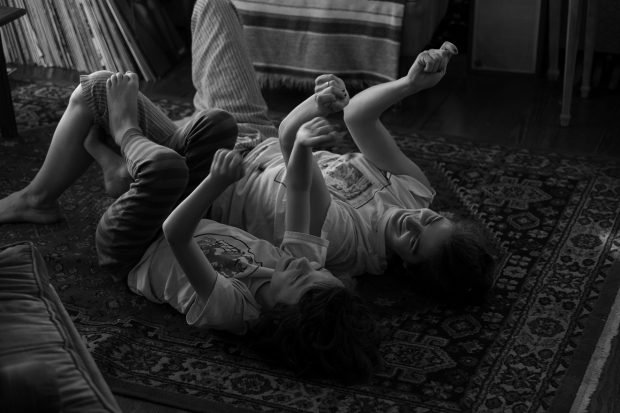
Woody Norman, Gaby Hoffmann (L-R)[/caption]
[caption id="attachment_113803" align="alignnone" width="1795"]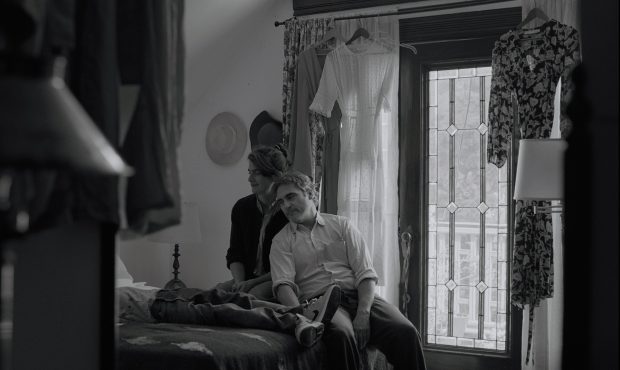
Gaby Hoffmann, Joaquin Phoenix (L-R)[/caption]
――I love the women you portray in the film, like the mom and Abbie in “20th Century Women.” In this film, I really loved Viv and the scene when she tells Johnny about the struggles with her honest feeling towards Jesse.
Mike Mills: The character Viv is three or four of my favorite mom friends combined. Gaby is very similar (to Viv), she's a mom and her worldview. But the scene that you talked about, that was Joaquin’s idea. Joaquin was describing a woman friend that he knows who is a mom who was saying basically all that stuff, and just the load that women have to carry as mothers is so much more intense than men and so different. It's just a different world. And us two men were just sort of tripping out on how different it is for women, and just talking about it and trying to understand it. So Joaquin was telling this whole story about how she struggles with her feelings, and then at the end, she gave this amazing piece of parenting advice that only a mom can give like, “Just give him some protein. He'll be OK.” And I was like, “Can I use all that in the film? Can I write all that down?” [laughs] So Joaquin basically said all that, I wrote it down, put it in the script, and then Gaby performs it.
――This film is beautifully shot in black and white. I especially loved the beach scene, and it reminded me of some of Ozu’s works. Why did you decide to shoot in black and white?
Mike Mills: Fellini also shot the beach a lot in black and white. So when we were on the beach, I’m like, “Oh, I'm in a Fellini movie!” with the pier and everything. So many of my favorite films are black and white. I wish that there were just more black and white movies. I think I convinced other people that I could make this one black and white with this pitch. The pitch was part of the movie is a myth, or it's like a fable to have a child and an adult walking through landscapes. That's like a mythological archetypal image. There's something really cool about it. And I wanted to play “Clair de Lune” when they're walking around, you know, all sorts of like drawing up ancient mythological vibes. And black and white really helps that because black and white isn't reality. It's sort of like about reality, but not reality.
――I see.
Mike Mills: Also, I love drawings. I kind of thought of this film as a drawing, not a painting, like a Bonnard drawing of his wife in the tub, like a very intimate quick sketch. Painting is very grand and tells you it's grand. I wanted my film to say it's humble, but actually kind of be grand, hopefully. So I thought black and white is good for that. And I love Satie’s piano music. Very, very big influence on me. This space it has, you can kind of walk in between the notes, it's just very spacious. To me, black and white is very spacious.
[caption id="attachment_113798" align="alignnone" width="2700"]
Woody Norman, Joaquin Phoenix (L-R)[/caption]
[caption id="attachment_113799" align="alignnone" width="1920"]
Woody Norman, Joaquin Phoenix (L-R)[/caption]
――This film features interviews with real children from across the states about what they think of the future. What did you learn the most through those interviews?
Mike Mills: As a parent and as someone who hangs out with kids a lot, I kind of knew that kids are that smart, or kids would be really perceptive. Also, kids are very willing to make themselves vulnerable, willing to expose themselves. So I knew I'd have that power. But I’m just sort of inviting other people to sit with how truly intelligent and perceptive young people are.
What I was hoping to do in this film partly by having the documentary part mixed with the narrative part was to do something kind of new. It's not like super new, there's been films that have done that. But to me, it felt like new. And the film is very much about present day reality, but it's in black and white, right? I remember telling the crew a lot, and just feeling this feeling of like, “Let's explore not what we should do, but what we want to do. Let's explore new forms of things that have elements that shouldn't be together like a myth and a documentary.” I do feel like all the forms of narrative and all the forms of filmmaking are so much more wide-open than our industry and our culture and our habits tell us they are. It’s not that my film is that adventurous, but it is a little bit [laughs.]
――Do you have any message to the Japanese movie fans who are looking forward to watching this film?
Mike Mills: Part of the joy of making it or the joy of the community of people that made it was this feeling of there are so many ways to do stuff. There are so many ways of trying things. Let's not take it all so seriously, and do something we feel genuine about.
[caption id="attachment_113800" align="alignnone" width="2509"]
Woody Norman[/caption]
[caption id="attachment_113801" align="alignnone" width="1600"]
Joaquin Phoenix[/caption]
text nao machida
関連記事のまとめはこちら
https://www.neol.jp/movie-2/
外部リンク
- 「脚本を書き始めたのはアメリカが本当におかしくなり始めた頃。とても私的な世界における親密さを描いて、それをアメリカに放り出したかった」 『カモン カモン』 マイク・ミルズ監督インタビュー/Interview with Mike Mills about “C’mon C’mon”
- 【試写会プレゼント】美しく繊細な描写で忘れ得ない一日と人々の内面を描く。オデッサ・ヤング、ジョシュ・オコナー、コリン・ファース、オリヴィア・コールマンらが共演『帰らない日曜日』トークショー付き試写会
- 【試写会プレゼント】「人生の最後に、自分のことを好きになれた」と語る永遠の名優。『オードリー・ヘプバーン』トークショー付き特別試写会
- 【試写会プレゼント】シンセポップバンド〈a-ha〉の軌跡を追ったドキュメンタリー映画『a-ha THE MOVIE』
- 【試写会プレゼント】独自の画風を確立したコロンビアの巨匠、フェルナンド・ボテロの素顔と、 独創的で多幸感あふれる作品の数々に迫るに迫る傑作ドキュメンタリー『フェルナンド・ボテロ 豊満な人生』アフタートーク付き試写会
この記事に関連するニュース
-
NAF Atsugi_ Military’s bungled response to PFAS spill worsened environmental impact, sickened sailors
沖縄タイムス+プラス / 2024年4月22日 17時0分
-
haveでもmakeでもない…使いこなすだけであなたの英語が急に"こなれた印象"になる「t」から始まるキラー動詞
プレジデントオンライン / 2024年4月20日 8時15分
-
【東京グレートベアーズ】ラファエル・アラウージョ選手 退団のお知らせ
PR TIMES / 2024年4月11日 18時40分
-
日本ゼオン、偽造防止にもなる新素材を取り入れたアート作品を世界初披露
PR TIMES / 2024年4月4日 9時45分
-
芸能事業「UQプロダクション」を開始し、社長自らアーティストデビュー
PR TIMES / 2024年4月2日 12時15分
ランキング
-
1Z世代が選ぶ「ゴールデンウィークあるある」トップ10発表! - 「どこに行っても激混み」「結局家が落ち着く」「昼夜逆転」を抑えた1位は?
マイナビニュース / 2024年4月26日 16時27分
-
2ねんきん定期便の見込額に注意!年金から天引きされる4つのお金を知っておこう
オールアバウト / 2024年4月25日 21時20分
-
3「スマホから変な音する」奇妙な現象、7時間後に予期せぬ真相発覚 ネットずっこけ「そんなことある?笑」
よろず~ニュース / 2024年4月26日 18時20分
-
4麻生氏のトランプ会談に透ける下心丸出しな“片思い”…前大統領にいたっては親友シンゾーの死を忘れた?
日刊ゲンダイDIGITAL / 2024年4月26日 9時26分
-
5【SNSで話題】エアコン冷房「室外機に濡れタオル」で節電になるのか - ダイキンが検証結果を発表
マイナビニュース / 2024年4月25日 9時42分
記事ミッション中・・・
記事にリアクションする
![]()
記事ミッション中・・・
記事にリアクションする

エラーが発生しました
ページを再読み込みして
ください



